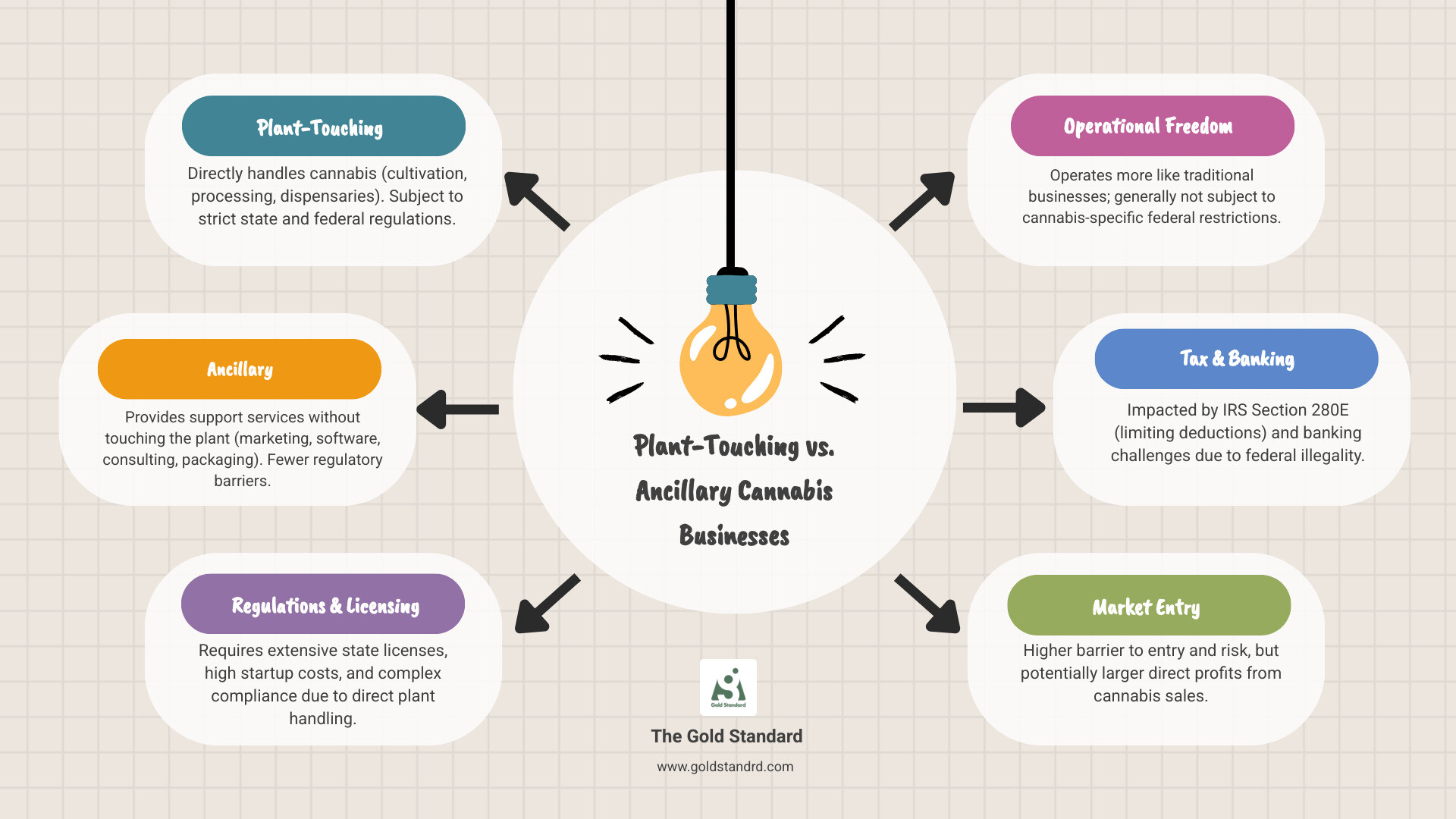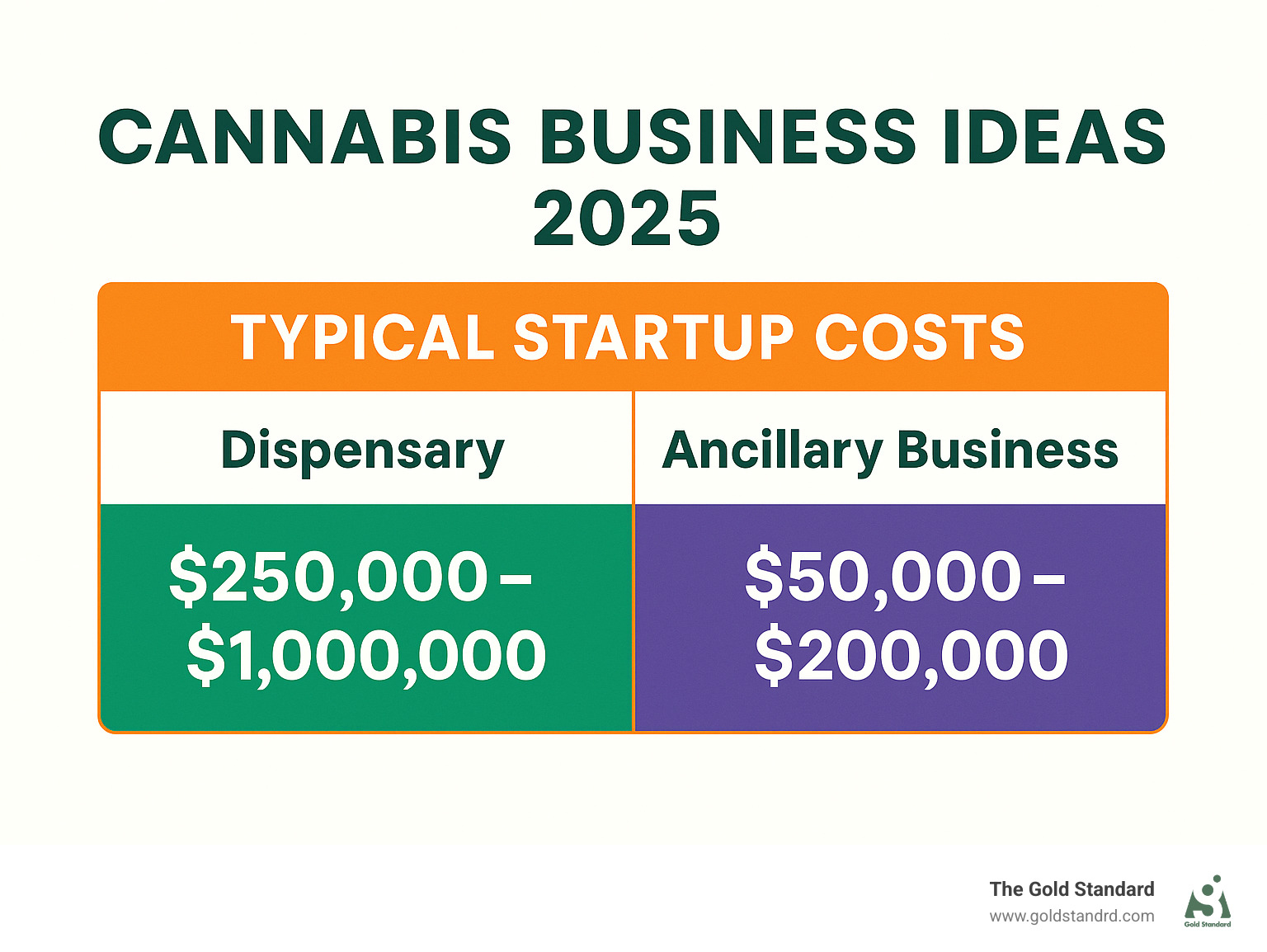
Cannabis business ideas: Unlock 2024 Profits
What Opportunities Exist in the Booming Cannabis Market?
Cannabis business ideas are exploding as the industry expands. With the U.S. cannabis market projected for 14.9% annual growth through 2030, entrepreneurs have countless ways to enter this thriving sector. The landscape has transformed, with 24 states permitting recreational use and 38 allowing medical use, creating opportunities far beyond traditional dispensaries.
Quick Answer: Top Cannabis Business Ideas
- Plant-Touching: Cultivation, dispensaries, manufacturing, processing
- Ancillary: Marketing agencies, software development, consulting, accessories
- Low Investment: Content creation, delivery driving, staffing agencies
- High Investment: Vertically integrated companies, cultivation facilities, REITs
- Emerging: Cannabis technology platforms, compliance software, testing labs
Opportunities fall into two main categories:
- Plant-touching businesses: Directly handle cannabis, facing higher regulations but offering bigger rewards.
- Ancillary businesses: Provide support services without touching the plant, offering fewer barriers and steady demand.
Consumer trends are also driving innovation, with the edibles and cannabis-infused skincare markets seeing rapid growth. However, challenges like federal illegality, banking issues, and marketing restrictions persist. Success requires strategic planning, a focus on compliance, and building cannabis-friendly partnerships.
I’m Stephen Gold, and my career has been dedicated to helping cannabis businesses steer these challenges and capitalize on emerging opportunities. My experience with cannabis business ideas, from dispensary launches to ancillary service development, provides unique insights into this evolving market.

Cannabis business ideas helpful reading:
- how to open a dispensary nj
- Cannabis dispensary marketing strategies
- Dispensary customer data analysis
What Are the Top Cannabis Business Ideas?
The cannabis industry is one of America’s most exciting growth sectors, especially in New York and New Jersey, where legalization has opened incredible doors. The ecosystem now includes everything from wellness products and cutting-edge technology to cannabis tourism. The key is finding where your skills and capital intersect with the industry’s needs. Some entrepreneurs thrive in the regulated plant-touching space, while others build successful ancillary businesses.
For those ready to dive deeper, exploring Cannabis Entrepreneurship resources can provide valuable insights.

What are some promising plant-touching ventures?
Plant-touching businesses directly handle cannabis through cultivation, processing, and retail. While they require significant investment and face strict regulations, they also offer the highest potential returns.
- Cultivation Facilities: These sophisticated operations require deep agricultural knowledge and precise environmental controls. Startup costs can range from $500,000 to over $5 million.
- Processing and Manufacturing: This is a lucrative area, especially with the growth of edibles and concentrates. These facilities can cost $350,000 to $2 million to establish.
- Dispensaries: The retail connection to consumers. A well-run dispensary in the NYC area can generate millions in annual revenue, but opening one requires $250,000 to $1 million in capital and navigating a competitive licensing process.
The biggest challenge is licensing and regulatory compliance. Each state has unique, evolving rules, and local zoning laws add another layer of complexity. Understanding How to Open a Dispensary and staying current on state cannabis laws is crucial.
What are some ancillary cannabis business ideas?
Ancillary businesses offer an excellent entry point with fewer licensing headaches and lower barriers to entry.
- Cannabis Accessories: A growing market for premium vaporizers, grinders, and storage solutions.
- Consulting Services: High demand for experts in compliance, operations, and marketing.
- Specialized Staffing Agencies: Connecting talent with growing businesses. Startup costs can be as low as $10,000.
- Technology and Software: Opportunities include compliance tracking systems, POS solutions, and management platforms.
- Cannabis Digital Marketing: A critical service since traditional advertising is restricted. We at The Gold Standard excel here, helping brands with strategic SEO and content. Learn more about our Cannabis Digital Marketing services.
- Delivery and Packaging: Logistics services and compliant, attractive packaging are in constant demand.
How can you overcome problems with your cannabis business ideas?
Every cannabis business faces challenges stemming from the conflict between state legalization and federal prohibition.
- Federal Illegality: Prohibits interstate commerce and creates banking and tax issues.
- Banking & Financing: Most traditional banks won’t work with cannabis businesses. Entrepreneurs must seek alternative financing from angel investors, VCs, or cannabis-specific funders.
- Tax Compliance: IRS Section 280E prevents plant-touching businesses from deducting ordinary business expenses, leading to very high effective tax rates.
- Marketing Restrictions: Major platforms prohibit cannabis ads, requiring a focus on SEO, content marketing, and email.
- Supply Chain Compliance: Meticulous record-keeping is essential to steer New York and New Jersey’s evolving rules. Maintaining Cannabis Compliance is vital for survival.
What Does It Take to Succeed with a Cannabis Business?
Starting a cannabis business requires more due diligence than a typical venture, but the rewards can be substantial. The industry rewards entrepreneurs who do their homework, perform detailed business planning, and build the right team.

Success hinges on a few key areas:
- Strategic Partnerships: Cannabis is a highly regulated industry. Your success depends on assembling a team of experienced lawyers, accountants, and marketing professionals who specialize in the cannabis space.
- Thorough Business Planning: A well-run dispensary can generate millions annually, but the risk is also high. A detailed business plan covering licensing, financing, compliance, and marketing is essential from day one.
- Creative Marketing: With traditional advertising channels off-limits, you need a strong brand and a smart digital strategy. This is where specialized agencies like The Gold Standard make a difference. We focus on building brands through compliant SEO, content, and community engagement in New York City, Long Island, and New Jersey. Explore our Cannabis Branding Strategies and let us help you develop your cannabis marketing strategy with us.

Frequently Asked Questions About Starting a Cannabis Business
What are the main categories of cannabis businesses?
Businesses are divided into two categories:
- Plant-touching: Directly handle cannabis (cultivation, processing, dispensaries). They face high regulation but offer high rewards.
- Ancillary: Support the industry without touching the plant (marketing, tech, consulting, accessories). They have lower barriers to entry.
What are some specific business ideas within the plant-touching cannabis sector?
Promising plant-touching cannabis business ideas include cultivation facilities (growing), processing labs (creating edibles/concentrates), retail dispensaries, and distribution services.
What are some specific business ideas within the ancillary cannabis sector?
Top ancillary ideas include specialized marketing agencies, compliance software development, consulting, packaging solutions, testing labs, and cannabis accessories retail.
What are the typical startup costs associated with different types of cannabis businesses?
Costs vary widely by business type:
- High-Investment (Plant-touching): Dispensaries ($250k – $1M+), Cultivation ($500k – $5M+).
- Mid-Investment (Ancillary): Testing labs or packaging companies ($100k – $500k).
- Low-Investment (Ancillary): Consulting or content creation ($1k – $5k).
What are the key licensing and regulatory problems for cannabis businesses?
Key problems include navigating complex and competitive state-specific licensing in places like New York and New Jersey, adhering to strict local zoning laws, and maintaining constant compliance with evolving product safety and marketing rules.
What are the unique financial challenges faced by cannabis businesses?
Due to federal illegality, businesses face:
- Banking: Limited access to traditional banks, forcing reliance on cash or high-fee specialty banks.
- Financing: Difficulty securing traditional loans, requiring a search for angel investors, VCs, or other alternative funding.
- Taxes: IRS Section 280E prohibits standard business deductions for plant-touching companies, leading to extremely high effective tax rates.
What are the growth potential and market trends within the cannabis industry?
The U.S. market is projected for strong annual growth. Key trends include rising demand for edibles and wellness products (like CBD skincare), the emergence of specialized cannabinoids (CBG, CBN), and a move toward premium, craft products.
What are the best practices for entrepreneurs entering the cannabis market?
- Conduct thorough research on state and local laws (e.g., NYC, New Jersey).
- Develop a comprehensive business plan.
- Build a strong team of experts (legal, financial, marketing).
- Secure adequate funding upfront.
- Prioritize compliance in all operations.
How can businesses steer marketing restrictions in the cannabis industry?
Since traditional ads are banned, success relies on:
- SEO: Optimizing for search terms like “dispensary near me.”
- Content Marketing: Building authority with educational content.
- Direct Marketing: Using email and SMS to reach customers.
- Strategic Branding: Creating a memorable and trustworthy brand identity.
- Specialized Agencies: Partnering with firms like The Gold Standard that know the rules.
What role do partnerships play in cannabis business success?
Partnerships are crucial for navigating regulations (legal experts), managing finances (accountants), and building a brand (marketing agencies). Strategic alliances with others in the supply chain can also improve efficiency and market access.
What are the key legal considerations for starting a cannabis business?
Beyond licensing, you must consider local zoning laws, state-specific rules on vertical integration, product liability, and intellectual property protection for your brand and products.
What are the risks and rewards associated with starting a cannabis business?
- Risks: High startup costs, complex regulations, banking issues, high taxes, and intense competition.
- Rewards: High growth potential, significant profit margins, and the opportunity to be a leader in an innovative and rapidly expanding industry.
How can technology be leveraged within the cannabis industry?
Technology is crucial for success. Key applications include seed-to-sale tracking systems for compliance, POS and e-commerce platforms for retail, data analytics for understanding consumer behavior, and marketing tech like SEO and CRM tools.



